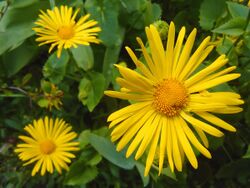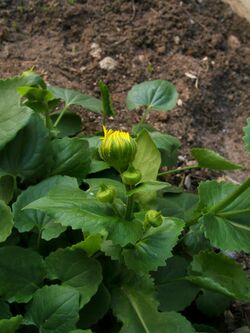Biology:Doronicum orientale
| Leopard's bane | |
|---|---|

| |
| Scientific classification | |
| Kingdom: | Plantae |
| Clade: | Tracheophytes |
| Clade: | Angiosperms |
| Clade: | Eudicots |
| Clade: | Asterids |
| Order: | Asterales |
| Family: | Asteraceae |
| Genus: | Doronicum |
| Species: | D. orientale
|
| Binomial name | |
| Doronicum orientale Hoffm.
| |
| Synonyms[1] | |
| |
Doronicum orientale, the leopard's bane, is a European plant species in the family Asteraceae.
Description
Doronicum orientale is a perennial herb that has daisy-like yellow flower heads on long, straight stems, which attract nectar-eating insects. The plants grow to approximately 2 feet (60 cm) tall. The basal foliage is bright green with cordate leaves that have scalloped margins. Its native habitats include moist, rocky outcrops and woodland areas.[2]
Etymology
The specific epithet "orientale," means "eastern" and is in reference to its native range of eastern Europe,[2] not eastern Asia.
Distribution
It is native to southeastern Europe (Italy, Greece, the Balkans, Hungary, Moldova, Ukraine , southern European Russia)[3][4] and parts of southwest Asia (Turkey, South Caucasus).[5][6]
Cultivation
Doronicum orientale is widely cultivated as an ornamental.[7] There are a few reports of the species having escaped cultivation and been found growing wild in parts of Canada , but the plant apparently failed to become established there.[8] D. orientale is a hardy (to zone 3) perennial, blooming in early spring. It likes both shade and sun and is easily grown in moist, fertile soil. The plant attracts butterflies.[2] Cultivars include 'Little Leo', which is semi-double.
Toxicity
All parts of this plant are poisonous to humans.[9]
References
- ↑ The Plant List, Doronicum orientale Hoffm.
- ↑ 2.0 2.1 2.2 "Doronicum orientale 'Leonardo Compact' - Plant Finder". https://www.missouribotanicalgarden.org/PlantFinder/PlantFinderDetails.aspx?taxonid=271644&isprofile=0&.
- ↑ Altervista Flora Italiana, Doronico orientale, Kaukasus-Gämswurz, gemsrot, Doronicum orientale Hoffm. includes photos and European distribution map
- ↑ Plantarium, Doronicum orientale Hoffm. Описание таксона, Русскоязычные названия, Дороникум восточный in Russian with photos and partial distribution map
- ↑ Royal Horticultural Society, Doronicum orientale, Caucasian leopard's bane
- ↑ "Antioxidant activity of some Turkish medicinal plants". Nat Prod Res 29 (24): 2308–12. 2015. doi:10.1080/14786419.2015.1005618. PMID 25649168.
- ↑ Naturegate, Leopard's Bane, Doronicum orientale
- ↑ Flora of North America, Oriental leopard’s-bane, Doronicum orientale Hoffmann, Commentat. Soc. Phys.-Med. Univ. Lit. Caes. Mosq. 1: 8. 1808.
- ↑ Pink, A. (2004). Gardening for the Million. Project Gutenberg Literary Archive Foundation. https://www.gutenberg.org/ebooks/11892.
Wikidata ☰ Q5228460 entry
 |


